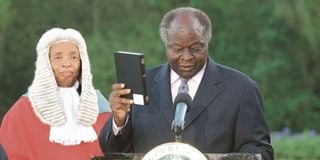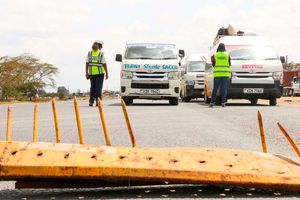Premium
The night swearing in that blotted Kibaki’s rich legacy

The late President Mwai Kibaki being sworn in by then Chief Justice Evan Gicheru on Sunday, December 30, 2007.
He was credited with revitalising Kenya’s struggling economy from a negative percentage to 7 percent in just five years.
Then the 2007 general election happened and everything went south.
The day was Sunday, December 30, 2007, and the time was some minutes to 7pm.
Kenyans saw live images on their TVs as the late president Mwai Kibaki was sworn in for a second term after controversially winning the hotly contested 2007 election.
The Electoral Commission of Kenya (ECK) had announced that Kibaki had garnered 4.58 million votes against his closest rival Raila Odinga’s 4.35 million.
But the night swearing marked the beginning of Kenya’s darkest hour.
Shortly after the ceremony at State House, Nairobi, Mr Odinga’s Orange Democratic Movement (ODM) called a Press conference where they declared their candidate the President-elect and announced their intention to form a parallel government.
So hurriedly organised was the event that some of the invited guests were seen on live TV running to their seats as President Kibaki was taking the oath.
As this happened, violence broke out in various parts of the country.
To arrest the situation, the Government suspended all live broadcasts citing the need for “public safety and tranquillity”.
A statement from the Ministry of Information and Communications also directed media houses and journalists to stop any broadcast of “inciting or alarming” material.
The statement was signed by the then permanent secretary in the ministry, Dr Bitange Ndemo, citing instructions from the Minister for Internal Security, Mr John Michuki.
Kibaki had been sworn in less than two hours after the declaration shortly after 4pm by the Electoral Commission that he had won a second term.
The official results were announced through the national broadcaster, KBC-TV, after an earlier attempt at Kenyatta International Conference Centre degenerated into chaos.
“I declare Mwai Kibaki the president of the Republic of Kenya,” then commission chairman Samuel Kivuitu declared after reading the final tally of the election results.
He said any irregularities alleged by the Orange Democratic Movement were now in the domain of the law courts.
“The Electoral Commission has no jurisdiction over the issues raised. These are matters for the judiciary. We hope the courts would move expeditiously,” he said.
All local journalists had been ejected from the precincts of the KICC as the results were announced.
Soon after he was sworn in for a second term, President Kibaki pledged to ensure equal treatment and justice for all Kenyans and declared that he will soon appoint a “clean hands Cabinet” that reflects the face of the country.
He promised to serve all Kenyans equally regardless of who they voted for in the election.
“I ask all Kenyans to set aside all the divisive views and opinions we held during the elections and embrace one another as brothers and sisters,” he said.
The violence continued to spread as Mr Odinga’s supporters said his victory had been stolen.
This saw the intervention of the international community that brought former UN secretary-general the late Kofi Annan to lead the mediation process.
The violence continued until late January 2008 when both Mr Kibaki and Mr Odinga shook hands at the steps of Harambee House.
By then, official figures show that nearly 1,200 had died and 350,000 others uprooted from their homes.
The mediation process bore the grand coalition government with Mr Odinga being appointed the Prime Minister until early 2013 when President Uhuru Kenyatta was elected president.
But as they say, every cloud has a silver lining. It is after the events of the night swearing-in and the ripple effect that Kenya adopted a new constitutional requirement that provides enough timelines for presidential election losers to file a petition at the Supreme Court before the president elect is sworn in.





